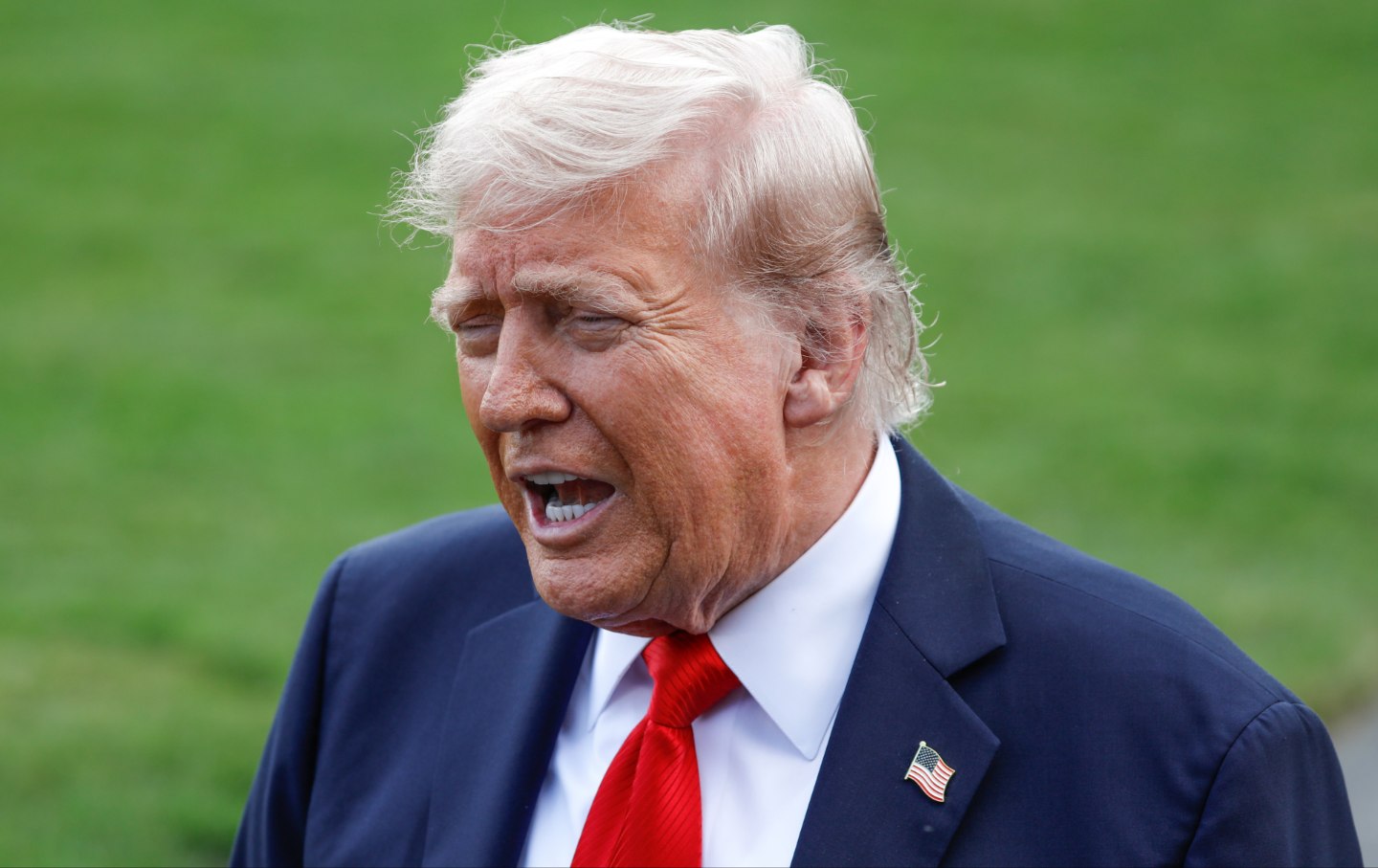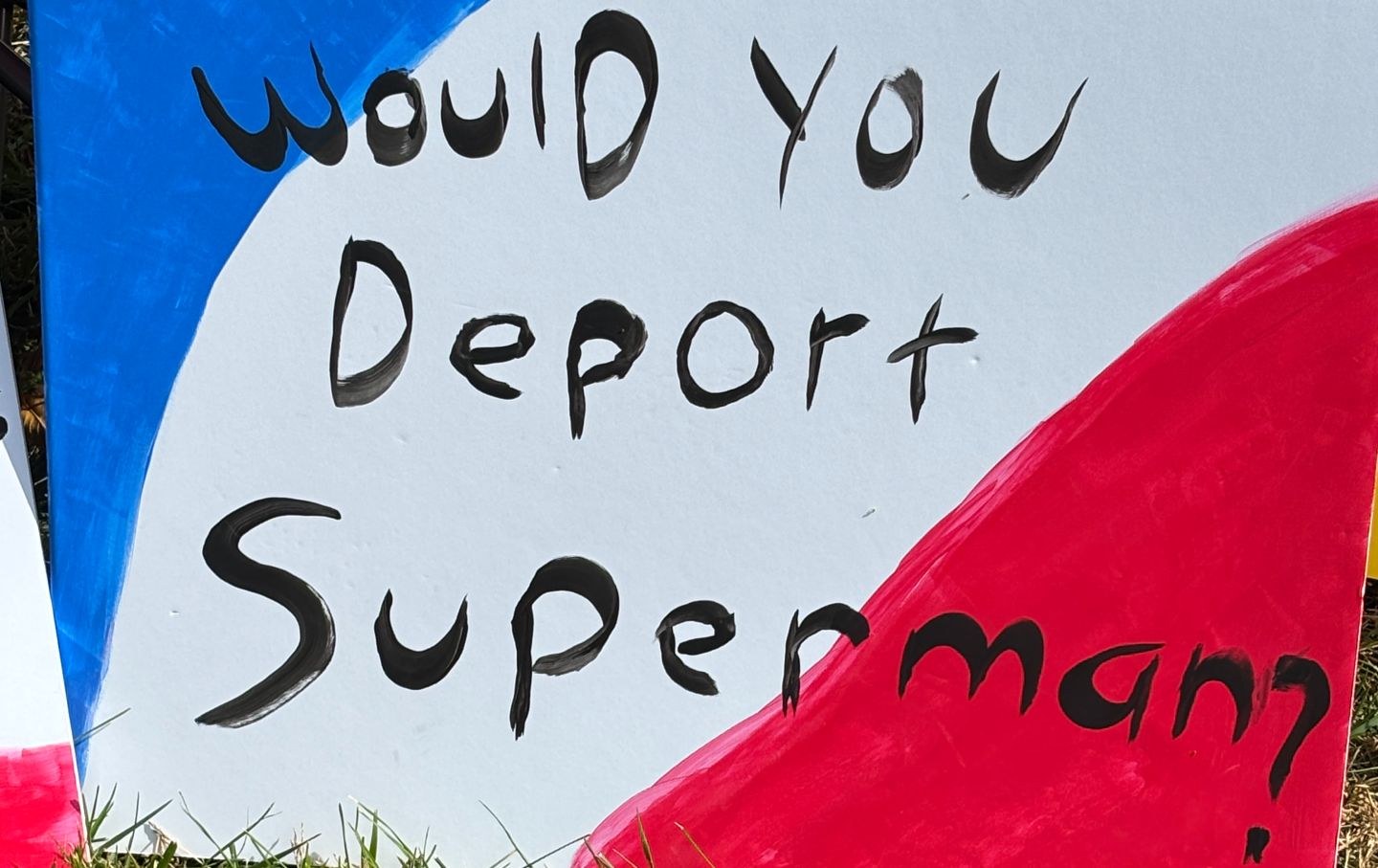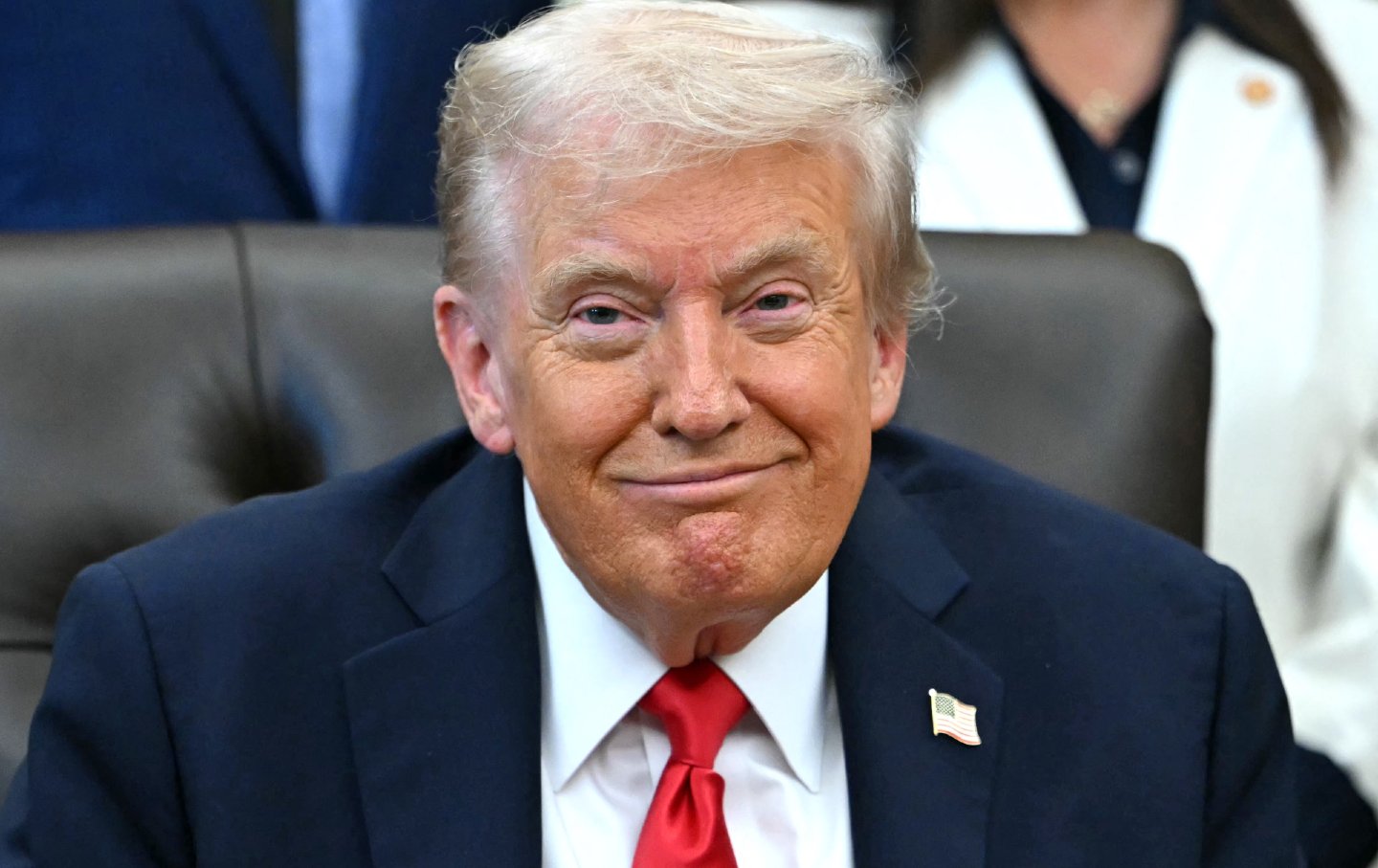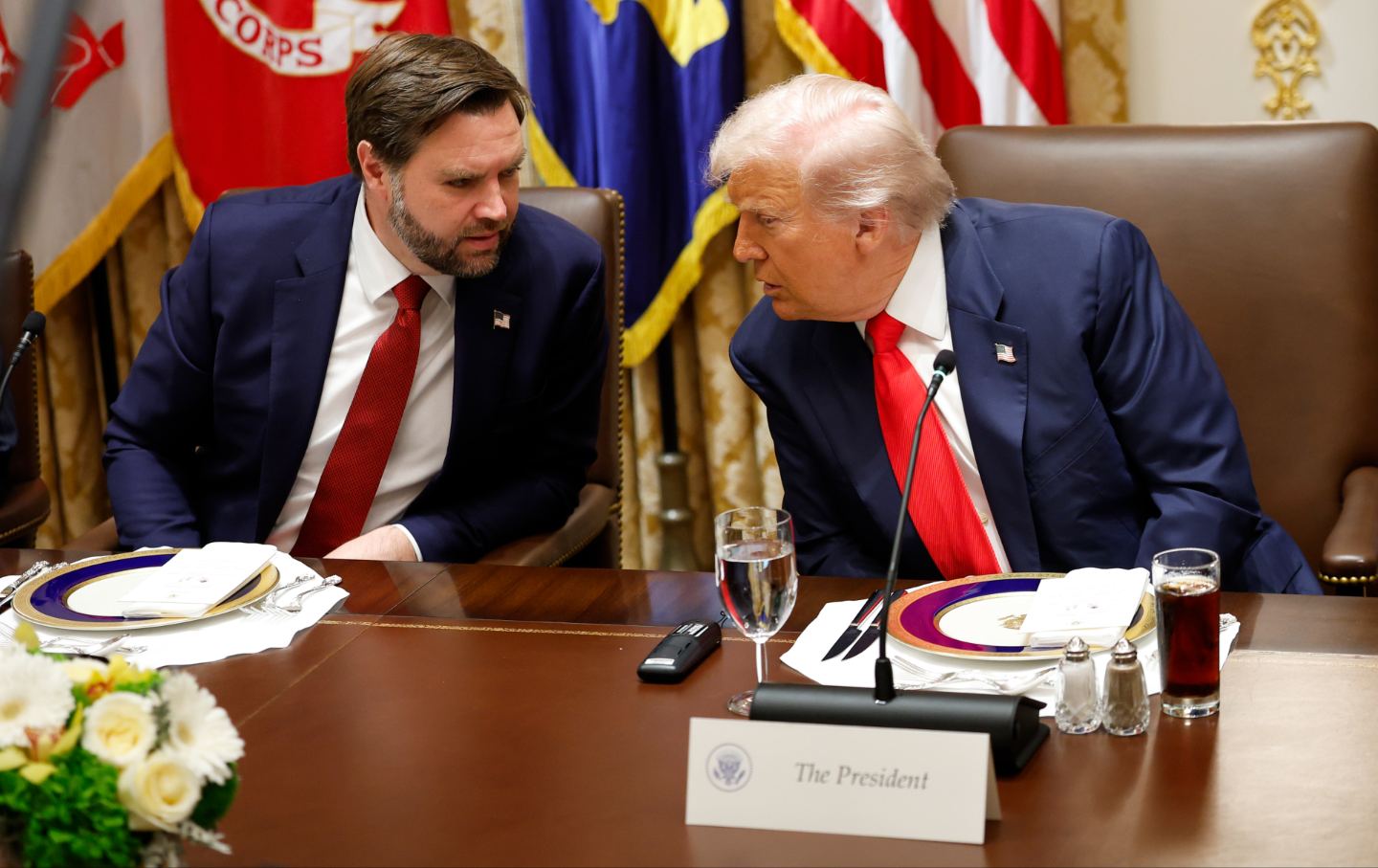Politics
/
October 20, 2025
The president’s scatological No Kings post expresses the ugly emotion fueling his authoritarian rule.

Donald Trump speaks to the press at the White House on September 11, 2025.
(Yasin Ozturk / Anadolu via Getty Images)
On Saturday, nearly 7 million Americans took to the streets in the largest one-day protest in the nation’s history to oppose Donald Trump’s authoritarianism under the slogan “No Kings!” Despite the absurd Republican smear of protesters as violent extremists, the marches were peaceful, patriotic, and perhaps even too high-minded for their own good. Certainly, the phrase “No Kings” evokes a venerable civic-minded small-r republican heritage that transcends ideological and party lines. At best, anti-Trump passion is merely the opening for a larger process of liberals radicalizing. The clear mainstream appeal of No Kings led right-wing pundits to shift their party line from earlier complaints that the protests were filled with antifa anarchists who “hate America” to mockery that the event was dominated by old, white people and thus lacking in vitality.
Trump himself has had two contrary responses to the No Kings marches. In an interview with Fox recorded on Friday, Trump contested the critique that he’s a would-be monarch, saying, “They’re referring to me as a king. I’m not a king.”
But on Saturday, Trump posted on Truth Social a disturbing video, almost certainly created by AI, that indicated he was less inclined to refute the accusation of royal aspirations than to revel in the fantasy of being a sovereign who could degrade his subjects with impunity. The New York Times offered a typically euphemistic description of this “fake video,” writing delicately that it “showed him wearing a crown and flying a jet labeled ‘King Trump’ that dumps brown liquid on protesters.” The newspaper went on, with only slightly more candor, to explain that the video depicted the president “dropping a brown liquid resembling feces onto the heads of protesters, who appeared to be gathered in a city.”
Current Issue

As distasteful as Trump’s video is, it deserves to be talked about without evasion: It’s a fantasy of Trump as a king who drops shit on peacefully protesting citizens exercising their First Amendment rights. In other words, Trump was shit-posting in every sense of the word.
The normal response to such posts is to tut-tut them as breaches of presidential norms and civility. But such prim rejoinders are beside the point. Trump was twice elected president. Whether we like it or not, he is the norm, and mourning for a lost era of politeness has done nothing to stop him.
The normal defense by Trump’s supporters to such vulgarity is to dismiss it as a joke and ask why the president’s critics don’t have a sense of humor. But this MAGA apologia is no more convincing than liberal opprobrium.
Trump’s jokes are rarely funny—and they always tell us something about him. As we’ve been taught by Sigmund Freud and Gershon Legman (the great exegetist of dirty limericks), jokes are rarely innocent. Comedy has a latent as well as a blatant meaning, and clowning is a way of giving public vent to—as well as legitimizing—emotions (often anxiety and anger) that are socially unacceptable. Following this line of thought, the philosopher Jean-Paul Sartre cogently noted in his Anti-Semite and Jew (1944) that Nazis often used absurdly over-the-top expressions of anti-Jewish hatred—ideas that seemed so fantastical they elicited nervous laughter—to make antisemitism palatable.
It’s striking to contrast Trump’s sickening post with a genuinely satirical deployment of scatological humor mocking kingly power. In 1831, Honoré Daumier, one of the greatest of all caricaturists, drew a lithograph titled Gargantua that depicted King Louis-Philippe I as a grotesque Rabelaisian giant who consumes gold and pours out stool in the form of fake titles of nobility for those who paid him. Daumier was jailed for this brilliant depiction of royal corruption. Daumier’s drawing has the tonic and cleansing force of all great satire because it upholds immutable moral principles. Trump’s post is anti-satire: not a denunciation of bullying and authoritarianism but a reveling in the pleasures of inflicting suffering. It makes one feel queasy and unclean.
Trump’s unhinged scatological nightmare is not so much a satirical transgression as a revelation, a key to the impulses of his authoritarian politics. He has always been moved by anger and resentment against those he thinks are insufficiently respectful of him. As his political career has progressed, these vengeful motives have only grown more sadistic. It’s not enough to politically defeat his foes or to enact policies they dislike. Trump clearly wants to humiliate and debase his enemies.
Trump’s disgusting post is only one piece of evidence pointing to the fact that the No Kings accusation is completely on the mark. If Trump is energized by personal vengefulness, he is surrounded by cronies more than willing to harness that anger toward their political goal. They too want Trump to be a king, not just to degrade the opposition but to enact an irreversible political transformation pushing America to the right.
Writing in Semafor, David Weigel noted that Trump has wide approval among Republicans in a project of reviving the “imperial presidency” (which was only modestly rolled back after the Watergate scandal and Richard Nixon’s 1974 resignation):
[W]ith a few libertarian exceptions, [Republicans] see a lot to like about Trump stripping power from the legislative branch of the US government.
Trump is undoing post-Watergate norms that took away the president’s right to impound congressionally appropriated money, strike enemies without congressional approval, and govern without the distraction of politicized investigations—and most Republicans would respond: What’s wrong with that? Who, they wonder, has actually benefited from reining in the “imperial presidency”?
Stephen Miller, the agenda-setting White House deputy chief of staff for policy, has claimed that Trump enjoys “plenary authority” as president, meaning his power is nearly without limit. Steve Bannon, an unofficial adviser who has long shaped MAGA ideology, has been even more explicit in celebrating the unchained presidency, delighting in the fact that Congress is as servile and irrelevant in Trump’s America as the Duma is in Vladimir Putin’s Russia.
In a recent episode of his Internet show War Room, Bannon outlined an expansive view of the Article 2 powers of the president:
[Trump is] Chief Executive Officer of the country. That means he can fire who he wants and the appropriations bill is a ceiling not a floor. He can hold money back in impoundment. As Commander in Chief…he can repel invasions, he can go after our enemies, and most importantly, I think…he is the Chief Magistrate and Chief Law Enforcement Officer of the United States government. So the Justice Department and FBI are not hermetically sealed away from the executive branch.
Popular
“swipe left below to view more authors”Swipe →
Bannon has also suggested that Trump has the right to suspend the writ of habeas corpus to implement his immigration crackdown.
All of these policies, combined with Trump’s likely illegal unilateral bombing campaign in the Caribbean seas, are assertions of the power of an absolute sovereign. Trump is trying to rule as a king, and not a benign one. He thrills at being a monarch who craps all over the people of the world and his nation’s constitutional traditions. In that sense, his AI post is truly an honest expression of his goals.
More from The Nation

The decisive factor isn’t his ads or charisma. It is the public financing of election campaigns, and it should be replicated across the United States.
David Sirota

Brewster’s rally drew more than 4,000 people for a rousing refutation of Donald Trump. Should the district’s GOP House Representative Mike Lawler, up for reelection in November, w…
Joan Walsh

In this week’s Elie v. U.S., The Nation’s justice correspondent connects the dots between the Supreme Court’s Voting Rights Case and Trump’s whites-only refugee policy.
Elie Mystal


In a post-shame era, racist slurs and Nazism can be shrugged off.
Jeet Heer


